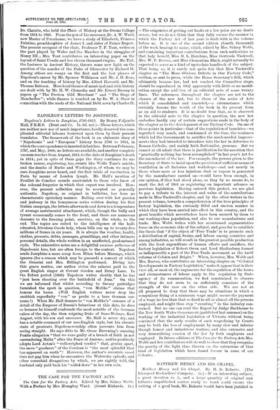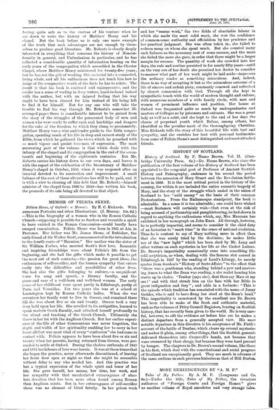MATTHEW HENRY AND HIS CHAPEL.
Matthew Henry and his Chapel. By H. D. Roberts. (The Liverpool Booksellers' Company. 5s.)—If an interesting subject, a, great devotion to it, and a large quantity of original and hitherto unpublished matter ready to hand could ensure the writing of a good book, Mr. Roberts would have been justified iu feeling quite safe as to the success of his venture when he sat down to write the history of Matthew Henry and his chapel. But the book before us is only one more example of the truth that such advantages are not enough by them- selves to produce good literature. Mr. Roberts is clearly deeply interested in everything that concerns the history of Noncon- forinity in general, and Unitarianism in particular, and he has collected a considerable quantity of information bearing on the early years of the congregation which assembled in the Chester Chapel, where Matthew Henry ministered for twenty-five years; but he has not the gift of working this material into a connected, living whole, and all his enthusiasm does not teach him how to judge of the comparative worth of the facts he has to relate. The result is that his book is confused and unimpressive, and the reader has a sense of wading in deep waters, hand-in-hand indeed with the author, but with an injured feeling that his way ought to have been cleared for him instead of his being left to find it for himself. But for any one who will take the trouble to find his way through Mr. Roberts's somewhat ill- arranged pages there is considerable interest to be gained from the story of the struggles of the persecuted body of men and women who were ready to suffer such real hardships and dangers for the sake of the freedom to which they clung so passionately. Matthew Henry was a wise and tender guide to the little congre- gation, spending much of his life in deep and earnest study of the Bible, from which he gathered the views which he preached with so much vigour and quaint terseness of expression. The most interesting part of the volume is that which deals with the infancy of the chapel and its congregation in the end of tho seven- teenth and beginning of the eighteenth centuries. But Mr. Roberts carries his history down to our own days, and leaves it with the report of the celebration of the bicentenary of Matthew Henry's chapel in October, 1900, when it was reopened after an interval devoted to its renovation and improvement. A small balance of the cost of these alterations has still to be paid, and it is with a view to clearing off this debt that Mr. Roberts—himself minister of the chapel from 1896 to 1900—has written his book, the proceeds of its sale being all devoted to that object.



















































 Previous page
Previous page